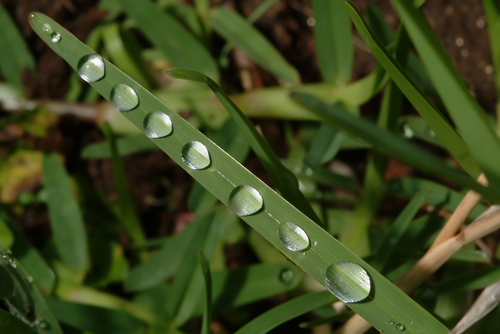 In a country with few natural resources and where the most famous body of water is the Dead Sea, Israel is looking beyond its arid landscape and taking the lead in water technology, the latest export-oriented industry to help it weather the effects of the global meltdown.
In a country with few natural resources and where the most famous body of water is the Dead Sea, Israel is looking beyond its arid landscape and taking the lead in water technology, the latest export-oriented industry to help it weather the effects of the global meltdown.The force behind the Jewish state's entry into the budding multibillion dollar industry has been decades of expertise in satisfying local demand. Now, a growing number of Israeli firms are eyeing lucrative overseas markets, offering cutting-edge expertise in areas such as desalination technology, sewage-eating bacteria and wastewater treatment.
"Israel is definitely one of the leaders, if not the leader, when it comes to water. ... I think of Israel as the Silicon Valley of water," said Shawn Lesser, president of Sustainable World Capital, an Atlanta investment group that focuses on clean energy and water technology companies.
Reflecting the growing prominence of water technology, Israel's fastest growing technology company this year was Aqwise, a water treatment company that uses small, bacteria-dispensing plastic cubes to break down sewage, increasing treatment efficiency and capacity.
Another company, Israeli start-up TaKaDu, has found a high-tech solution to the age-old problem of leaky pipes. Instead of relying on heavy wrenches and machinery, the software firm uses advanced algorithms and mathematical models to monitor for small leaks and unusual activity that lead to costly pipe bursts. It's selling the technology to water companies. One of the first software-only solutions, TaKaDu is also conducting tests in Europe and Asia.
Water leaks cost utility companies $14 billion a year, according to a 2006 World Bank report. Halting these leaks could save enough water to meet the needs of an additional 200 million people a year, the report said.
Faced with the water shortage problem every day, Israel needs to develop technology that increases water conservation and production. Yearly consumption hovers around 200 cubic meters (7,000 cubic feet) per capita. That's about one-sixth the amount of water consumed by an average Californian.
Israel's push into water technology mirrors the aggressiveness of the resource-poor nation in other sectors. In a region where many of its neighbors hold some of the world's biggest oil reserves, Israel has none. Instead, it has long focused on high-tech development and environmental innovation.
Israeli company Netafim pioneered drip irrigation, a technique that can grow crops in harsh conditions, in the 1960s. It has since grown into a global company with $500 million in annual sales.
Thanks to advances in wastewater treatment, most of the country's agriculture is now cultivated with recycled water, according to the Agriculture Ministry.
Only recently has Israel begun to realize the enormous opportunities of exporting its technology.
Israel's Trade Ministry hopes the country can export $2.5 billion in water technology in 2011, a jump from $1.4 billion last year and $750 million two years earlier.
Source: U.S.News & World Report


 Chicken is a consumer favorite all over the world, but many people aren't happy with the way chicken arrives at their table - both from a humanitarian and an environmental point of view.
Chicken is a consumer favorite all over the world, but many people aren't happy with the way chicken arrives at their table - both from a humanitarian and an environmental point of view.  The SOS Pet Association announced today that they would be launching a campaign to feed stray cats in Tel Aviv. Starting Monday, 350 feeding bowls will be distributed throughout the city to feed the hungry felines!
The SOS Pet Association announced today that they would be launching a campaign to feed stray cats in Tel Aviv. Starting Monday, 350 feeding bowls will be distributed throughout the city to feed the hungry felines! Like death and taxes, garbage is inevitable. And with environmental concerns growing, cities across the globe are searching for smarter ways to dispose of their trash.
Like death and taxes, garbage is inevitable. And with environmental concerns growing, cities across the globe are searching for smarter ways to dispose of their trash. Yissum, the technology transfer arm of the Hebrew University of Jerusalem, introduced a novel method for preventing and affecting biofilm of bacteria and fungi at the WATEC Conference, held in Tel Aviv, Israel on November 17-19, 2009. The invention, developed jointly by the Hadassah Medical Organization and Hebrew University of Jerusalem (the Faculty of Dental Medicine and the Institute of Drug Research), utilizes novel heterocyclic compounds that disrupt cell-cell communication, thereby interfering with the formation of biofilms. Unlike the use of antibiotics which often induce formation of resistant strains, the compounds do not need to kill the microorganisms that cause the biofilms.
Yissum, the technology transfer arm of the Hebrew University of Jerusalem, introduced a novel method for preventing and affecting biofilm of bacteria and fungi at the WATEC Conference, held in Tel Aviv, Israel on November 17-19, 2009. The invention, developed jointly by the Hadassah Medical Organization and Hebrew University of Jerusalem (the Faculty of Dental Medicine and the Institute of Drug Research), utilizes novel heterocyclic compounds that disrupt cell-cell communication, thereby interfering with the formation of biofilms. Unlike the use of antibiotics which often induce formation of resistant strains, the compounds do not need to kill the microorganisms that cause the biofilms. CHAI (Live) and HaKol Chai (They All Live) animal rights groups’ campaign to ban cart horses in Tel Aviv, and eventually around the country, achieved its first goal with the banning of horse-drawn carts from Tel Aviv streets. For over a decade, CHAI and its sister charity in Israel, Hakol Chai, pressured the Tel Aviv municipality to regulate, and later to ban, the practice of horses pulling heavily-laden carts through city streets. These animals are often starved, beaten, made to work in the hot sun without water, and not provided with veterinary care. CHAI was the first organization to raise this issue and the first to undertake a campaign to ban horse-drawn carts.
CHAI (Live) and HaKol Chai (They All Live) animal rights groups’ campaign to ban cart horses in Tel Aviv, and eventually around the country, achieved its first goal with the banning of horse-drawn carts from Tel Aviv streets. For over a decade, CHAI and its sister charity in Israel, Hakol Chai, pressured the Tel Aviv municipality to regulate, and later to ban, the practice of horses pulling heavily-laden carts through city streets. These animals are often starved, beaten, made to work in the hot sun without water, and not provided with veterinary care. CHAI was the first organization to raise this issue and the first to undertake a campaign to ban horse-drawn carts. Sewage - human, agricultural and industrial - is an enormous untapped energy source. It represents some of the world's finest biological matter, and in America, as elsewhere, it is literally going down the drain.
Sewage - human, agricultural and industrial - is an enormous untapped energy source. It represents some of the world's finest biological matter, and in America, as elsewhere, it is literally going down the drain. Israel is No. 5 on the top 10 list of cleantech countries of 2009 compiled by Sustainable World Capital's Shawn Lesser. His ranking is based on government initiatives and programs, large investment mandates, entrepreneurial innovation as well as cultural and social drivers:
Israel is No. 5 on the top 10 list of cleantech countries of 2009 compiled by Sustainable World Capital's Shawn Lesser. His ranking is based on government initiatives and programs, large investment mandates, entrepreneurial innovation as well as cultural and social drivers: Urban parents are all too familiar with the hassles of driving and parking in the city. Whether it's taking the kids to school or doing the daily round of errands, using a car isn't good for the environment or your peace of mind.
Urban parents are all too familiar with the hassles of driving and parking in the city. Whether it's taking the kids to school or doing the daily round of errands, using a car isn't good for the environment or your peace of mind. Zoya and I wanted to take this moment to congratulate Professor Yonath and all of Israel for this exciting turn of events--Professor Yonath is only the fourth woman to win the Nobel prize in Chemistry and the first woman since 1964. Professor Yonath's work offers a great deal of contribution to the development of more effective antibiotics which will have the potential to treat infections that were otherwise drug resistant.
Zoya and I wanted to take this moment to congratulate Professor Yonath and all of Israel for this exciting turn of events--Professor Yonath is only the fourth woman to win the Nobel prize in Chemistry and the first woman since 1964. Professor Yonath's work offers a great deal of contribution to the development of more effective antibiotics which will have the potential to treat infections that were otherwise drug resistant. The Kingdom of Judea was known as the land of Judean date palm just as my home state Illinois is known as the “Land of Lincoln“. Prized for its beauty, shade, and medicinal properties, Judean dates were famous throughout the civilized world. The tree so defined the local economy that Emperor Vespasian celebrated the conquest by minting the "Judaea Capta", a special bronze coin that showed the Jewish state as a weeping woman beneath a date palm. The date growing as a commercial fruit export stopped at the end of 70 CE, when the Second Temple was destroyed by the Romans. From then, the tradition was lost and Judean date palms became extinct. This symbol of grace and elegance was lost, but not forgotten. It was featured on the 10-shekel coin of the New Israeli Shekel.
The Kingdom of Judea was known as the land of Judean date palm just as my home state Illinois is known as the “Land of Lincoln“. Prized for its beauty, shade, and medicinal properties, Judean dates were famous throughout the civilized world. The tree so defined the local economy that Emperor Vespasian celebrated the conquest by minting the "Judaea Capta", a special bronze coin that showed the Jewish state as a weeping woman beneath a date palm. The date growing as a commercial fruit export stopped at the end of 70 CE, when the Second Temple was destroyed by the Romans. From then, the tradition was lost and Judean date palms became extinct. This symbol of grace and elegance was lost, but not forgotten. It was featured on the 10-shekel coin of the New Israeli Shekel. The Spanish Government has disqualified the Israeli team from the bi-annual Solar Decathlon because the team is located in “occupied territory” - Samaria. Engineers, architects, solar experts and other visitors to the Solar Decathlon will thus be denied the opportunity to study and benefit from the solar-powered energy-economical “Stretch House” designed and built by students of the Ariel University Center of Samaria.
The Spanish Government has disqualified the Israeli team from the bi-annual Solar Decathlon because the team is located in “occupied territory” - Samaria. Engineers, architects, solar experts and other visitors to the Solar Decathlon will thus be denied the opportunity to study and benefit from the solar-powered energy-economical “Stretch House” designed and built by students of the Ariel University Center of Samaria. The first Renault electric cars will be available to Israelis beginning in 2008, after Shai Agassi's Better Place, which is building the infrastructure for electric cars in Israel, signed an agreement with Renault this week for the import of the Fluence ZE model. Better Place will handle the importing and sales, with motorists who buy electric cars "subscribing" to their battery refueling services. Better Place has committed to selling a total of 100,000 vehicles in Israel by 2016.
The first Renault electric cars will be available to Israelis beginning in 2008, after Shai Agassi's Better Place, which is building the infrastructure for electric cars in Israel, signed an agreement with Renault this week for the import of the Fluence ZE model. Better Place will handle the importing and sales, with motorists who buy electric cars "subscribing" to their battery refueling services. Better Place has committed to selling a total of 100,000 vehicles in Israel by 2016. Better Place founder and CEO Shai Agassi, whose company will be providing services for electric cars in Israel and other countries, says he believes that at least half the cars that will be sold by 2020 will be electric cars. Agassi was speaking at a press conference at the Frankfurt Motor Show Tuesday.
Better Place founder and CEO Shai Agassi, whose company will be providing services for electric cars in Israel and other countries, says he believes that at least half the cars that will be sold by 2020 will be electric cars. Agassi was speaking at a press conference at the Frankfurt Motor Show Tuesday. Well, today is a bit of a melancholy day due to the significance of what happened in New York 8 years ago. It's hard to believe it's been 8 years, isn't it? At any rate, I had written a poem on 9/11/02 in the parking lot of a mechanic shop while I was waiting for them to change my oil. This poem was written on the back of a visitor parking pass I'd found in my car. It's not the greatest poem but remember that it was written in about 3 minutes in a parking lot. Just thought I'd share...please take a moment of silence to remember. This post is obviously not about Israel or any liberal issues but the moment to change the world is ours and days like this remind me of that.
Well, today is a bit of a melancholy day due to the significance of what happened in New York 8 years ago. It's hard to believe it's been 8 years, isn't it? At any rate, I had written a poem on 9/11/02 in the parking lot of a mechanic shop while I was waiting for them to change my oil. This poem was written on the back of a visitor parking pass I'd found in my car. It's not the greatest poem but remember that it was written in about 3 minutes in a parking lot. Just thought I'd share...please take a moment of silence to remember. This post is obviously not about Israel or any liberal issues but the moment to change the world is ours and days like this remind me of that.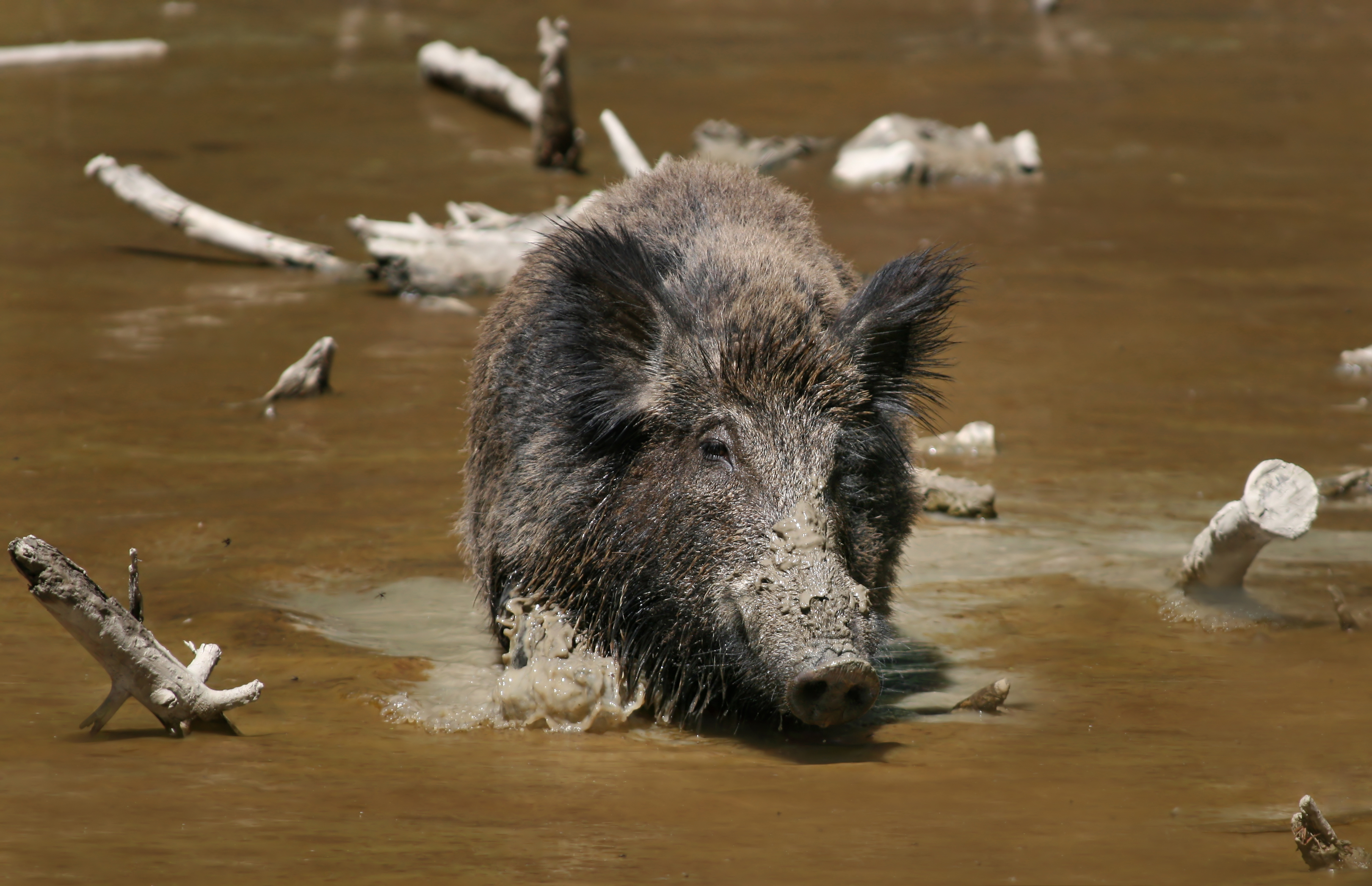 I am thinking I may have to abandon the Zionist cause. Just look at what Israeli Jews are doing to animals! Picture a classroom full of wild pigs. Picture menacing-looking Jews telling them that they will not be allowed to leave until they master several halakhic intricacies. I bet you, they even make pigs sign something. Why, you ask? These wild pigs are terrorists in training, that's why! According to the Bethlehem-based
I am thinking I may have to abandon the Zionist cause. Just look at what Israeli Jews are doing to animals! Picture a classroom full of wild pigs. Picture menacing-looking Jews telling them that they will not be allowed to leave until they master several halakhic intricacies. I bet you, they even make pigs sign something. Why, you ask? These wild pigs are terrorists in training, that's why! According to the Bethlehem-based  A biodegradable, environmentally-friendly plastic bottle made in Israel from corn could be hitting the market soon.
A biodegradable, environmentally-friendly plastic bottle made in Israel from corn could be hitting the market soon.
 Installation of photovoltaic solar energy systems on the roofs of the Golomb and Rokach schools in Tel Aviv has been completed. Sunday Solar Energy and Rand Metal and Enamel Industries finished the project three months after winning a Tel Aviv-Jaffa Economic Development Authority tender.
Installation of photovoltaic solar energy systems on the roofs of the Golomb and Rokach schools in Tel Aviv has been completed. Sunday Solar Energy and Rand Metal and Enamel Industries finished the project three months after winning a Tel Aviv-Jaffa Economic Development Authority tender. The Israel Airports Authority plans to install a pilot 50-kilowatt solar energy system on a 500 square meters area at the long-term parking lot. The size of the project is limited to the amount of electricity that can be sold by private power producers to Israel Electric Corporation (IEC).
The Israel Airports Authority plans to install a pilot 50-kilowatt solar energy system on a 500 square meters area at the long-term parking lot. The size of the project is limited to the amount of electricity that can be sold by private power producers to Israel Electric Corporation (IEC). Israeli architect Zvika Tamari has his visions set on a rather unusual and unconventional project -- an eco-dome located between Tel Aviv and Jerusalem, surrounded by green spaces and designed to promote sustainable living. Reusing water for irrigation, natural ventilation and solar energy are among the ways this eco-dome would bring the concept of modern, green living to a whole new level.
Israeli architect Zvika Tamari has his visions set on a rather unusual and unconventional project -- an eco-dome located between Tel Aviv and Jerusalem, surrounded by green spaces and designed to promote sustainable living. Reusing water for irrigation, natural ventilation and solar energy are among the ways this eco-dome would bring the concept of modern, green living to a whole new level.
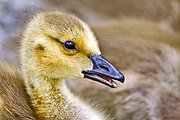
 I strongly believe that concern for the wellbeing of animals is a necessary attribute of a civilized person – or a civilized country. Israelis certainly subscribe to this notion. In fact, Israel can share with the world its success story in animal adoption efforts. What they did was simple yet effective – a national database of animals needing adoption. True, maybe a country that is more substantial than a tiny speck on the world map doesn’t need a nationwide database. Maybe all we need is something on a smaller scale…
I strongly believe that concern for the wellbeing of animals is a necessary attribute of a civilized person – or a civilized country. Israelis certainly subscribe to this notion. In fact, Israel can share with the world its success story in animal adoption efforts. What they did was simple yet effective – a national database of animals needing adoption. True, maybe a country that is more substantial than a tiny speck on the world map doesn’t need a nationwide database. Maybe all we need is something on a smaller scale… Israel and Jordan are joining forces to produce biofuel from agricultural waste in a project which will be showcased at Israel’s Water Technologies and Environmental Control Exhibition (WATEC) this November. Run in cooperation with the Peres Center for Peace and using German technology, the project produces biofuel energy without harming food production and offers an alternative for removal and treatment of agricultural waste.
Israel and Jordan are joining forces to produce biofuel from agricultural waste in a project which will be showcased at Israel’s Water Technologies and Environmental Control Exhibition (WATEC) this November. Run in cooperation with the Peres Center for Peace and using German technology, the project produces biofuel energy without harming food production and offers an alternative for removal and treatment of agricultural waste.  Whenever I think of them, I can’t resist that Homer Simpson-style exclamation “Mmmm, strawberries….” But do strawberry fields and the desert go together? I guess so, surprising as it is! Here are some details for the technically inclined:
Whenever I think of them, I can’t resist that Homer Simpson-style exclamation “Mmmm, strawberries….” But do strawberry fields and the desert go together? I guess so, surprising as it is! Here are some details for the technically inclined:


 Minister of Industry, Trade and Labor Benjamin Ben-Eliezer has instructed the Chief Scientist Dr. Eli Opper and Investment Promotion Center director Hezi Zaieg to give priority to cleantech.
Minister of Industry, Trade and Labor Benjamin Ben-Eliezer has instructed the Chief Scientist Dr. Eli Opper and Investment Promotion Center director Hezi Zaieg to give priority to cleantech.  The largest and most ambitious "green" project in Israel – and ranking up with the top urban reclamation projects worldwide – gets a huge boost Sunday night, when the lighting system at Sharon Park will be turned on for the first time. But the lights won't use power from the electrical grid. The system will instead be powered by the recycled trash upon which Sharon Park is being built, with bio-gasses that have been festering on the site for decades to be used to power the lights.
The largest and most ambitious "green" project in Israel – and ranking up with the top urban reclamation projects worldwide – gets a huge boost Sunday night, when the lighting system at Sharon Park will be turned on for the first time. But the lights won't use power from the electrical grid. The system will instead be powered by the recycled trash upon which Sharon Park is being built, with bio-gasses that have been festering on the site for decades to be used to power the lights. If you drive a hybrid, you are undoubtedly paying less at the pump than your SUV driving counterparts. Here in the US, that is a tremendous incentive. But what if Uncle Sam also gave you a tax break just because you're giving the planet a pollution break? That's the intention of the Israel Finance Ministry--offering special discounts on hybrids and in turn adding additional taxes and duties on gas guzzlers. The Ministry hopes that this will encourage Israelis to love the Earth even more by buying eco friendly cars and hopefully dumping their older, less efficient, more pollution inducing cars. Let's hope it works, keep it green, Israel!
If you drive a hybrid, you are undoubtedly paying less at the pump than your SUV driving counterparts. Here in the US, that is a tremendous incentive. But what if Uncle Sam also gave you a tax break just because you're giving the planet a pollution break? That's the intention of the Israel Finance Ministry--offering special discounts on hybrids and in turn adding additional taxes and duties on gas guzzlers. The Ministry hopes that this will encourage Israelis to love the Earth even more by buying eco friendly cars and hopefully dumping their older, less efficient, more pollution inducing cars. Let's hope it works, keep it green, Israel!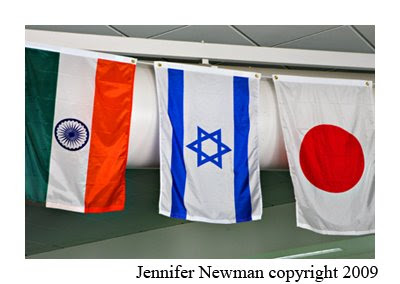 A special thanks to Kendall Toyota in Miami, FL for letting me use this red Prius in the picture as a model for this post. They even have an Israeli flag among their flag display in their showroom! Please check out
A special thanks to Kendall Toyota in Miami, FL for letting me use this red Prius in the picture as a model for this post. They even have an Israeli flag among their flag display in their showroom! Please check out  Ben-Gurion University of the Negev (BGU) researchers have developed a new, highly energy-efficient window technology, featuring two reversible panes that will save energy all year round in homes and office buildings.
Ben-Gurion University of the Negev (BGU) researchers have developed a new, highly energy-efficient window technology, featuring two reversible panes that will save energy all year round in homes and office buildings. You gotta love the Israeli Defense Forces (IDF)...they are like no other army in this world. But to be fair, Israel is like no other country in the world -- their military is a big part of the spirit of the nation, a nation that prides itself on planting trees as a national pastime that is essentially, the heart and soul of the nation.
You gotta love the Israeli Defense Forces (IDF)...they are like no other army in this world. But to be fair, Israel is like no other country in the world -- their military is a big part of the spirit of the nation, a nation that prides itself on planting trees as a national pastime that is essentially, the heart and soul of the nation. Researchers from Tel Aviv University say they have found a novel, cheap, effective, and reliable way to help predict the intensity of the next big flood, using common cell phone towers across the United States. Their model, which analyzes cell phone signals, adds a critical component to weather forecasting never before available.
Researchers from Tel Aviv University say they have found a novel, cheap, effective, and reliable way to help predict the intensity of the next big flood, using common cell phone towers across the United States. Their model, which analyzes cell phone signals, adds a critical component to weather forecasting never before available.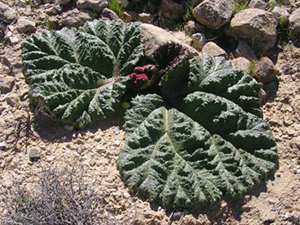 The world’s first "self-watering" plant has been discovered in Israel’s Negev desert – one of the driest regions on earth. The Desert Rhubarb can hold 16 times more water than its rivals and has developed a unique ability to effectively water itself in its barren habitat.
The world’s first "self-watering" plant has been discovered in Israel’s Negev desert – one of the driest regions on earth. The Desert Rhubarb can hold 16 times more water than its rivals and has developed a unique ability to effectively water itself in its barren habitat.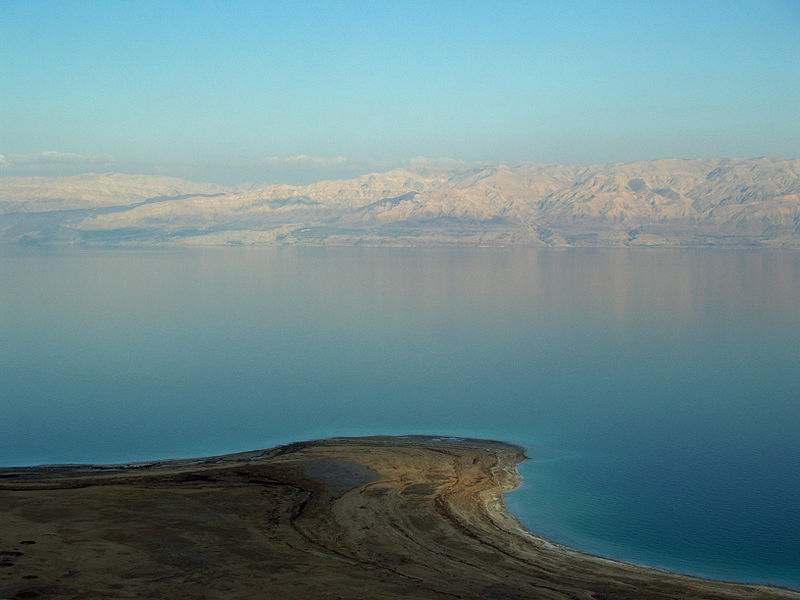
 I must admit, I never leave my house during daylight hours without a coat of Ahava sunscreen covering my skin. Why pay twice the price for Ahava (an Israeli company), you ask? Simple, Ahava, along with any Israeli made skincare and cleaning product is cruelty free. This is not merely the custom in Israel, it's the law. Believe it or not, a Likud (right wing) lawmaker proposed it to the Knesset. So don't forget your sunscreen, just make sure it's not tested on animals!
I must admit, I never leave my house during daylight hours without a coat of Ahava sunscreen covering my skin. Why pay twice the price for Ahava (an Israeli company), you ask? Simple, Ahava, along with any Israeli made skincare and cleaning product is cruelty free. This is not merely the custom in Israel, it's the law. Believe it or not, a Likud (right wing) lawmaker proposed it to the Knesset. So don't forget your sunscreen, just make sure it's not tested on animals! The World Bank has agreed to fund a pilot program of what could turn out to be one of the most ambitious water projects in the world – the Dead Sea Canal Project, which would see the construction of waterworks 112 miles in length, connecting the Red Sea and Dead Sea.
The World Bank has agreed to fund a pilot program of what could turn out to be one of the most ambitious water projects in the world – the Dead Sea Canal Project, which would see the construction of waterworks 112 miles in length, connecting the Red Sea and Dead Sea.